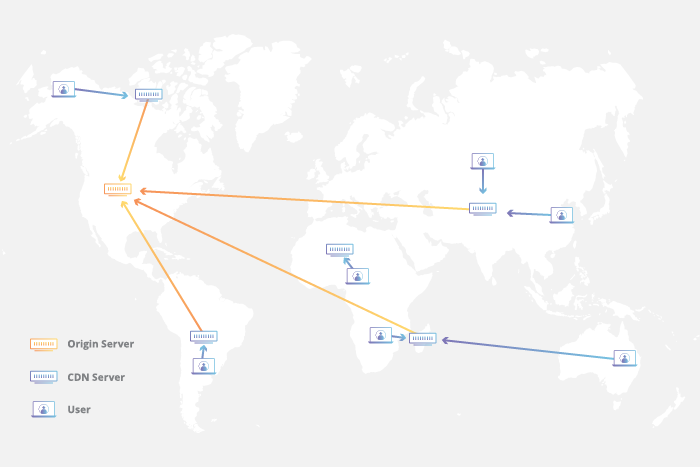What is a CDN?
Learning Objectives?
After reading this article you will be able to:?
- Define a content distribution network (CDN)
- Understand some of the benefits of using a CDN
- Explore more details of how a CDN works
What is a CDN??
A content delivery network or content distribution network (CDN) is a geographically distributed network of proxy servers and their data centers. The goal is to distribute service spatially relative to end-users to provide high availability and high performance. CDNs serve a large portion of the Internet content today, including web objects (text, graphics and scripts), downloadable objects (media files, software, documents), applications (e-commerce, portals), live streaming media, on-demand streaming media, and social media sites.
CDNs are a layer in the internet ecosystem. Content owners such as media companies and e-commerce vendors pay CDN operators to deliver their content to their end users. In turn, a CDN pays ISPs, carriers, and network operators for hosting its servers in their data centers.
CDN is an umbrella term spanning different types of content delivery services: video streaming, software downloads, web and mobile content acceleration, licensed/managed CDN, transparent caching, and services to measure CDN performance, load balancing, multi-CDN switching and analytics and cloud intelligence. CDN vendors may cross over into other industries like security, with DDoS protection and web application firewalls (WAF), and WAN optimisation
Is a CDN the same as a web host??
While a CDN does not host content and can’t replace the need for proper web hosting, it does help cache content at the network edge, which improves website performance. Many websites struggle to have their performance needs met by traditional hosting services, which is why they opt for CDNs. By utilising caching to reduce hosting bandwidth, helping to prevent interruptions in service, and improving security, CDNs are a popular choice to relieve some of the major pain points that come with traditional web hosting.
What are the benefits of using a CDN??
Although the benefits of using a CDN vary depending on the size and needs of an Internet property, the primary benefits for most users can be broken down into 4 different components:
We can help you with below recommendation
How does a CDN work?.
At its core, a CDN is a network of servers linked together with the goal of delivering content as quickly, cheaply, reliably, and securely as possible. In order to improve speed and connectivity, a CDN will place servers at the exchange points between different networks. These Internet exchange points (IXPs) are the primary locations where different Internet providers connect in order to provide each other access to traffic originating on their different networks. By having a connection to these high speed and highly interconnected locations, a CDN provider is able to reduce costs and transit times in high speed data delivery
Latency – How does a CDN improve website load times?.
When it comes to websites loading content, users drop off quickly as a site slows down. CDN services can help to reduce load times in the following ways:
- The globally distributed nature of a CDN means reduce distance between users and website resources. Instead of having to connect to wherever a website’s origin server may live, a CDN lets users connect to a geographically closer data center. Less travel time means faster service.
- Hardware and software optimizations such as efficient load balancing and solid-state hard drives can help data reach the user faster.
- CDNs can reduce the amount of data that’s transferred by reducing file sizes using tactics such as minification and file compression. Smaller file sizes mean quicker load times.
- CDNs can also speed up sites which use TLS/SSL certificates by optimizing connection reuse and enabling TLS false start.
Beyond placement of servers in IXPs, a CDN makes a number of optimisations on standard client/server data transfers. CDNs place Data Centers at strategic locations across the globe, enhance security, and are designed to survive various types of failures and Internet congestion.
CDNs can help your users load your website faster by serving your static resources in nodes all around the world.
Data Security – How does a CDN protect data?.
Information security is an integral part of a CDN. a CDN can keep a site secured with fresh TLS/SSL certificates which will ensure a high standard of authentication, encryption, and integrity. Investigate the security concerns surrounding CDNs, and explore what can be done to securely deliver content.
Share This Information









